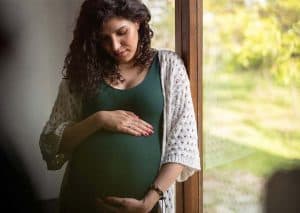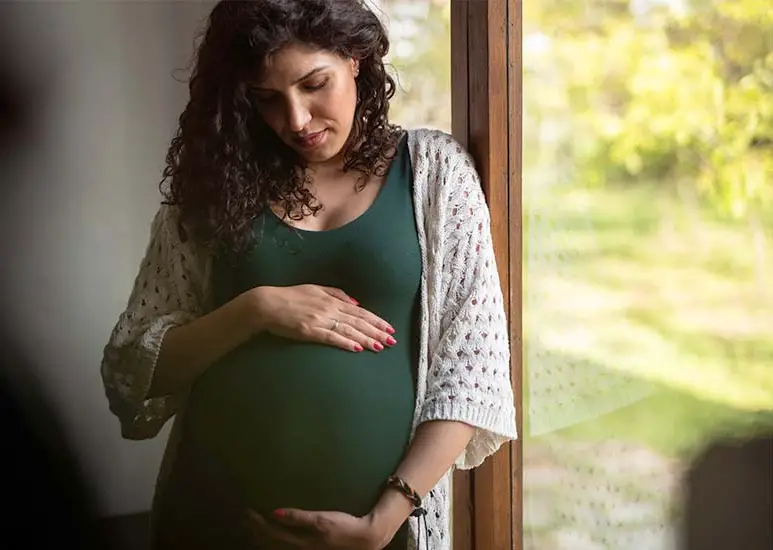
It is absolutely normal to have a baby at 34 or for that matter, at any age as long as you are a consenting adult. Lots of women get pregnant at 34 due to various reasons and they deliver perfectly healthy babies. If you are physically fit and emotionally prepared for pregnancy and raising a baby, both you and your baby are going to be fit as a fiddle.
Whether you admit it or not, we all have, to some extent, internalized society’s idea of “the right time” for major life decisions.
From where I stand, it’s the very opposite of selfish to have a baby in your mid or even late 30s, considering the better financial security, emotional stability, and wisdom that comes with age.
In 2016, for the very first time, American women in their 30s were having more babies than women in their prime childbearing age (20-24 years). Although the percentage of birthrate for American women in their 30s dropped slightly post-covid, there’s an evident change in the societal trends and priorities, for the better.
This is not to deny that there are very real and serious physical risks associated with pregnancy in 30s. But there are many undeniable positive effects too, let me highlight some of them for you –
5 Amazing Benefits of Having a Baby at the Age of 34
The right time to have a baby is whenever you are ready, there, I said it. Speaking from first-hand experience, while having a baby in your 20s might be more medically advantageous, motherhood in your early thirties is just as awesome (and in some instances, better) for the following reasons –
Contents
1. Better Emotional Maturity
While it’s not true for everyone, most people grow more emotionally mature with age. You and I aren’t anymore the same person we were when we were teens, are we?
According to this study, children born to mothers older than 31 exhibited signs of better emotional health and social skills than children born to mothers younger than 31.
This was a direct result of healthy parenting techniques shown by older moms who were less likely to resort to reprimanding or physically disciplining their kids every time shit went wrong.
2. Children of Older Moms Are Likely to Be Smarter
Again, it’s not true for everyone but in many cases, children born to older moms are likely to be smarter, according to this study.
Although there are many variables involved, it is generally due to the fact that technology is evolving rapidly. So, the longer you wait to have kids, the higher are your kid’s chances of being familiar with advanced technology.
And referring to the previous point, empathetic parenting encourages children to strive for excellence without debilitating fear of failing and disappointing their parents. This naturally boosts confidence and helps them perform well academically.
3. Money Game Will Be Stronger
Let’s face it, raising children is expensive. From baby proofing the home, buying an endless supply of diapers, baby clothes, car seats, this and that, the expenses are endless.
A lot of young parents end up taking extra shifts and balancing multiple jobs to just break even. The chances of you doing better career-wise and earning a higher salary is much higher in your 30s than your 20s.
More often than not, children born to older moms are more likely to receive higher education than children born to younger parents.
It’s likely due to the fact that it’s much easier to give your children a good education and a great childhood when you can comfortably afford to do so.
4. You Will Have Help
By the time you turn 34, most of your peers will have already become parents. You know what that means? You get to receive precious parenting advice from them.
Parents are not some omniscient beings. They make mistakes too and most of them learn from their mistakes.
And if you are observant enough, by the time you are in your mid 30s and expecting a child, you will have a fairly decent idea of certain basic dos and don’ts.
5. Older “New Moms” Live Longer
Sounds absurd, right? Well, the stats imply otherwise. According to this study that included 1200 women in or approaching menopause, women who give birth in their 30s and 40s typically live longer than younger moms. But how on earth, exactly?
The answer is longer telomeres which is frequently associated with healthy longevity. Telomeres are end caps on the DNA of our chromosomes.
According to the latest research, telomere length is usually longer in women who conceive after 33. This is due to a variety of factors such as access to better healthcare and a healthy diet older mothers can afford when they are doing well career-wise.
Read Also: Is It Selfish to Have a Baby at 40
3 Common Risks Associated with Pregnancy at 34
Unfortunately, there are a few common health risks associated with pregnancy over the age of 30. However, everyone is built different and I have seen plenty of mid-30 women bringing their pregnancy to term without any issue.
If you are thinking of having a baby at the age of 34, the first thing on your to-do list should be to talk to your healthcare professional. If you don’t have any pre-existing condition such as high blood pressure, diabetes, or thyroid problems, I think you’ll be good to go.
Since I have already discussed the pros of late motherhood, it only makes sense to highlight the possible cons as well, so here they are –
1. Chromosomal Abnormalities
10-30% of fertilized human eggs contain the wrong number of chromosomes. The risk of chromosomal abnormalities increases with age which subsequently increases the risk of miscarriage.
Chromosomal abnormalities can lead to Down’s Syndrome. According to this study, women who are 35 years or older are at a higher risk of giving birth to children with Down’s Syndrome. 35 isn’t 34 but the gap isn’t exactly huge.
2. Increased Risk of Miscarriage
Many studies have implied the association between late pregnancy and higher risk of miscarriage. This average risk of miscarriage for mothers between the age of 30-34 is 12%, according to this data. This is again due to the increased risk of fetal chromosomal abnormality.
3. Complications During Delivery
There’s a strong correlation between maternal age and maternal morbidity caused by difficult labour and delivery complications.
According to this database, pregnant women older than 30 but younger than 35 had higher risk of preterm delivery, severe preeclampsia, and high blood pressure.
Women in their 30s are also more likely to require a C-section which comes with its own set of risks such as blood clotting inside a deep vein and hemorrhaging.
Highly Recommended Prenatal Tests If You Are Pregnant at 34
Just to be clear, I am not a certified medical professional. This is just a thoroughly-researched guide on tests you should get done to ensure a healthy pregnancy and healthy baby, and of course your peace of mind.
Your healthcare provider may recommend you the following pre-pregnancy test based on primary health check-up –
- Nuchal translucency ultrasound scan.
- Blood tests to check blood count and blood sugar level.
- Genetic screening test.
- Amniocentesis and chorionic villus sampling (CVS), performed prenatally to detect chromosomal abnormalities before birth.
- Cell-free fetal DNA (cffDNA).
- Thyroid hormone profile.
- Infection screening.
Your doctor may or may not ask for other tests to assess both you and your baby’s health.
Some FAQs
1. What is the percentage of getting pregnant at 34?
Ans. The odds of you getting pregnant between the age of 30-34 is pretty darn high, about 86%.
2. What is the percentage of miscarriage if you get pregnant at 34?
Ans. According to this source, there’s a 12% chance of miscarriage for women getting pregnant between the age of 30-34.
3. What is the best age to get pregnant after 30?
Ans. Anytime between 30-34 increases your odds of successfully bringing your pregnancy to term. From 35 onwards, there’s a higher risk of chromosomal abnormalities in the baby, and painful labor, delivery complications, severe preeclampsia for the mother.
In Conclusion
Pregnancy and motherhood is challenging at every age, it’s just the nature of the challenges that vary from age to age.
While the health risks associated with late pregnancy are definitely a cause for concern, as long as your test results show no signs of complications and you are emotionally and financially prepared to have a baby, 34 is the perfect time to welcome a new baby.
